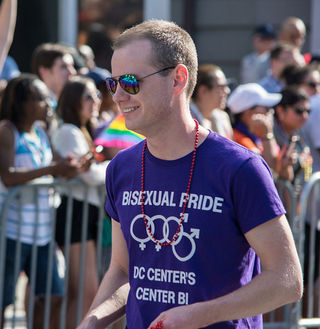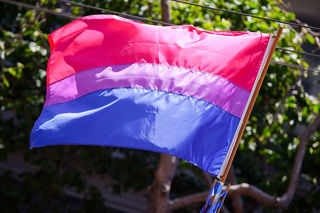Sex
Where Are All the Bisexuals Hiding?
For researchers and prospective partners, bisexuals can be challenging to find
Posted April 30, 2018

Over the past few years, research on bisexuality has blossomed, with growing numbers of studies revealing that self-identified bisexuals exist (in contrast to years of denial that bisexuality is anything but a phase), and that they have some unique issues. In one recent, nationally-representative study, bisexuals were found to be more likely to be nonmonogamous, and new studies on varying forms of bisexuality are published often.
Bisexuals also report lower levels of life satisfaction across their lifespan, compared to heterosexual and homosexual counterparts. Bisexuals are at higher risk for both mental health issues such as anxiety disorders, and physical health issues, compared to other sexual groups. A difficulty however, in understanding bisexuals, and what these health disparities mean, is that there may be many bisexual people, that researchers never see, which may affect the conclusions drawn. Lisa Diamond, PhD., whose work on sexual fluidity was revolutionary, at first suggested that evidence of sexual fluidity in males was almost nonexistent. She returned to the question later, giving a talk where she offered further data, and said: “I Was Wrong! Men’s Sexuality is Pretty Darn Fluid Too”
Bisexuals, however you define this, whether it is “mostly straight,” “on the down low,” “heteroflexible,” or any of the growing labels that capture the nuances of sexuality that doesn’t fit in the box, can be both difficult to find, and challenging to “pin down.” Some research suggests that females are more likely to identify as bisexuals, compared to males, and there does appear to be greater stigma for male bisexuals than females. But, the most clear, consistent finding across all recent research is that bisexuals are “invisible.” Bisexuals tend to be far less “out” or public about their sexuality than gay peers.
“Bisexual erasure” is the term used to describe the process whereby groups, including both heterosexuals and homosexuals, can deny a person’s bisexuality. A bi man is labeled as straight when he’s with a female partner, and as gay when with a male. A bi woman might be accused of simply “doing it for the attention,” when she engages sexually with a female. Compared to other groups, gay men, transgender persons, or lesbians, there isn’t a very cohesive bisexual community, though the American Institute of Bisexuality has done yeoman’s efforts to change this. The bi advocacy community often doesn't include many people who behave bisexually but don't identify as bisexual. This latter group may be much larger than people who identify as bi.
The end result of this erasure and invisibility, is that bisexuals struggle to find each other, and to be found by researchers. Researchers Eric Anderson, PhD. And Mark McCormack, Ph.D. published a valuable book, The Changing Dynamics of Bisexual Men’s Lives, where they describe their difficulties recruiting bisexuals through normal research means. They finally resorted to recruiting bisexual men on busy streets in major cities such as Los Angeles and New York.
Dating websites and apps often discriminate, intentionally or not, against bisexuals. Apps such as Tindr or Grindr are focused on finding one sex or the other. Major sites such as Match.com even limit users to “seeking a man or a woman.” “both” or “either” is rarely an option. Even on sites such as OkCupid, which are friendly to bisexuals, people who identify as bisexual report that they either get pursued as “bisexual unicorns,” or bisexual third partners for hetero couples looking for a threesome, or they get stigmatized by gay or straight people who reject their bisexuality. Different sexual communities can also have varying levels of acceptance of bisexuality. The swinging community tends to be very encouraging of female bisexuality, but historically reject and stigmatize any male bisexuality. Polyamorous groups tend to be much more accepting of all forms of bisexuality, but may reject or stigmatize casual, no-strings attached sexual behaviors. Having treated many bisexual patients, they often report great difficulties finding bisexual partners, and struggle to express their bisexuality in ways that are consistent with their identity and desires. Colleague Joe Kort, Ph.D., author of the book "Is My Husband Gay, Straight or Bi?" has encountered this dilemma many times in patients, and discusses in his writing the challenges that men encounter in expressing anything other heterosexuality.
Bisexual research participants have been found by researchers, using Craigslist Personals ads, or even ads on social media sites such as Tumblr, where bisexual and sexually-fluid porn found a niche. One famous Tumblr site, called “FYFF!” (not a safe work google search mind you, the acronym stands for F#*$ Yeah, Friendly Fire!) curated and celebrated porn involving male sexual fluidity, and boasted of hundreds of thousands of dedicated, loyal followers. But, in recent months, Craigslist personals ads were shut down to legal concerns, and Tumblr, along with other social media platforms, recently began shutting down many sex-oriented sites, including FYFF!.
Before FYFF! was terminated, the website operator kindly ran a brief, informal survey for me, helping me to gauge if finding bisexual partners was indeed as difficult for bisexuals as it is for researchers. Respondents were largely bisexual, or sexually fluid males, but we had 177 respondents. Of them, over half (91) responded that it was extremely difficult for them to find bisexuals as partners. 22 (12%) found bisexual partners through their social lives, and 57 (32%) found bisexual partners through online means, including sites such as Tumblr, Craigslist or hookup apps. Respondents made numerous comments such as “It’s difficult through any means, but online is easiest;” “I’ve not been able to find any bisexual partners willing to share,” “Relationships tend to block bisexual behavior;” “It’s hard to be up front with it,” and “I try to meet likeminded partners online but it’s difficult!” “People are so unfamiliar with bisexuals its not as widley accepted. When I find a partner they are usually straight or gay. And they rarely know my bisexuality. I tend to meet people online. I wish in person but usually on an app”
Consistent with research on the stigma towards male bisexuals, numerous respondents described that they tended to have separate relationships, either male-male, or male-female. Male sex partners were easily found on sites such as Grindr, but these men often kept their same sex behaviors secret, due to fears of rejection or judgment from female partners: “It's acceptable for females to go both ways, guys not so much. Still.” “It is still too taboo for males to be seen as bi. Bi women are a dime a dozen, but not bi men.” “I haven't ever really had a long-term romantic partner, largely due to the fact that I feel most women are unwilling to accept a bisexual male partner (I consider myself bisexual and heteroromantic).” “I don’t tell women I’m bi because then they won’t have sex with me.”
Bisexuals vary, as to what they are looking for – long term bisexual intimate relationships, or bisexual sexual experiences which don’t develop into longterm connections. “I've only ever been with one night stands I find on Craigslist. It seems like the type of people who are open to one-night stands via that site aren't particularly judgmental or closed-minded.” “(I meet people) in lifestyle events that are open to bisexuality,” “I also live in an open minded and predominantly queer identifying community and so seek partners there as well.”
“Almost all my friends will ask what I like better-men or women, like I have to choose one or the other. And that's from the gay and straight binaries. Then I get the friends who joke that they'd like to become a lesbian (never a gay guy) because they've had it with their dating life. In general, people don't understand or don't want to understand, even if I try to explain.”

There is some evidence that stigma against bisexuality is decreasing, with more people willing to acknowledge same sex attractions or behaviors. However, it is clear that the impact and pressures of bisexual secrecy, invisibility and erasure continue to have a substantial effect, notably upon bisexual men, and bisexual women who are interested in more than “unicorn” status.
Will bisexuals become easier to find in the future? Perhaps. But, issues such as the lack of a cohesive bisexual community reflecting those who are not "out," and the varying levels of bisexual acceptance amongst both straight and gay communities seem unlikely to shift anytime soon. Because out bisexuals tend to be a smaller group, it seems unlikely they will hold any economic power, in order to sway changes in large, popular sites such as Match.com or Tindr, or Grindr, which might lead to greater bisexual connections. The recent changes in Internet laws and practices in fact appear to have the likelihood of making it even harder to find bisexuals, at least in the near short term, and worsening stigma and bias against bisexuals. Whether that impacts future research on bisexuality, and actually furthers a spiral effect which worsens bisexual invisibility, we shall have to see.
Addendum:
I appreciate all the comments and thoughtful replies here and online. I do stand by my points in the article, and will correct some misrepresentations:
- I've not meant to say that bisexuals are a "small" group, but that "out" bisexuals are a small group of the many people who are bisexuals. (I've clarified that above) Indeed, I believe that research indicates that including the "mostly straight" and the lesbians and gay males who occasionally have hetero sex, that there are more bisexually-behaving people than any other orientation group, besides hetero.
- However, of these many varied bisexually-behaving people (and I include fantasy/porn consumption), few identify as bi, or are out as bi. This is what contributes to and perpetuates the invisibility issue of bisexuality.
- As I indicate in the article, there are clear differences in experience, outness and reactions, between male and female bisexuals. I believe the quotes from the bi men responding to the FYFF survey make that quite clear. The fact that those men, and their experiences and words, are getting no attention in this dialogue is perhaps part of the issue.
- Please note that I said "relative" to other sexual communities, the bi community is less engaged and cohesive. Note the research showing that bi people are far less likely to boycott anti-LGBT products, and less likely to march in Pride parades. While there certainly are groups addressing bisexual community and needs, these groups are less cohesive than other LGBT groups, and, these groups don't include the many bisexually-behaving people who don't identify as bisexual and are not out as bi.
- Finally, as I suggest the bi community doesn't have as much economic power to change the social media/dating/hookup sites, I'm suggesting that this is because of the so-many bi people who are "invisible" as bi. I'm not suggesting that bisexuals are a small group, nor that they are economically depressed (though there are some research suggestions that this may be the case amidst some bisexuals). Because there are fewer people identifying as bi and seeking both sexes on dating sites, those companies have no significant economic incentive to change their approach.
I do appreciate everyone's attention to these issues. I think the attention is important, in order to try to address the stigma towards bisexuality that contributes to the invisibility problem.




